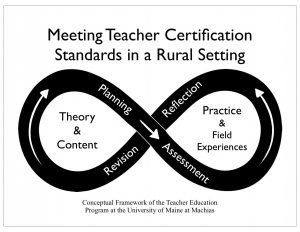About the Program
- individualized learning opportunities allow students to develop close relationships with classmates and faculty as they enjoy the pristine Down East environment.
- Applied learning begins in the first semester with a field placement in a local classroom and continues with field experiences throughout.
- In their senior year, students complete 15 weeks of full-time student teaching under the mentorship of a cooperating teacher.
Pluralism Policy
It is the philosophy of UMaine Machias’ education program that curricula and courses provide a balanced and thoughtful approach to gender, race, ethnicity and cultural diversity. Class presentations, discussions, assignments, evaluations, and texts incorporate, when appropriate, diverse histories, traditions, values and behaviors. These multicultural components reflect local, national and global human experiences and convey a sense of affirmation and appreciation of similarities and differences among people.
Conceptual Framework

The conceptual framework for UMaine Machias’ Education Program combines our guiding principles, theoretical foundation, and mission statement and drives decision-making at the program and course level.
Based upon Maine Department of Education, Rule Chapter 114: Chapter 114: Purpose, Standards and Procedures for the Review and Approval of Preparation Programs for Education Personnel (Unit Standard One)Learning Outcomes
Elementary Education Concentration
This program prepares students to teach kindergarten through grade eight. Completion of the Bachelor of Science in Education degree with a concentration in Elementary Education is a Maine Department of Education approved program for teaching endorsement #020 General Elementary Teacher (grades kindergarten-8). Students in this concentration will take the general education and education program core requirements, as well as:
- Praxis Core Academic Skills for Educators
- Praxis Elementary Education; Multiple Subjects
- 6 credits in Math, English and Language Arts, Science, Social Studies
- A 24-credit minor in one of the following subjects: visual arts, mathematics, English and language arts, life sciences, social studies OR music
Secondary Education Concentration
This program prepares students to teach in grades 7–12. Completion of the Bachelor of Science in Education degree with a concentration in Secondary Education is an approved program for the following Maine Department of Education teaching endorsements: Art, English, Life Science, Physical Science, Social Studies, and Mathematics. Students in this concentration will take the general education and education program core requirements, as well as:
- Praxis Core Academic Skills for Educators
- Praxis Content Area Exam
- A 24-credit minor in one of the following subjects: visual arts, mathematics, English and language arts, life sciences, social studies OR music
Special Education Concentration 🌐
This concentration leads to teacher preparation in working with students with mild to moderate disabilities. Students in this program must choose to focus on teaching students in kindergarten through grade eight, or grade seven through grade 12. Students in this concentration will take the general education and education program core requirements, as well as:
- Praxis Core Academic Skills for Educators
- Praxis Content Area Exam
- 33 credits of Special Education coursework
Special Education students are eligible to apply for the 4+1 Accelerated Online Master’s Degree program at the University of Maine (External Site), which allows them to take online master’s-level courses during their senior year of undergraduate study.
Inclusive Early Childhood Education Concentration 🌐
This concentration leads to teacher preparation in working with young children (birth through age five) with mild to moderate disabilities within inclusive settings. Students in this concentration will take the general education and education program core requirements, as well as:
- Praxis Core Academic Skills for Educators
- Praxis Content Area Exam
- a total of 12 credits in Liberal Arts English, Liberal Arts Mathematics, Liberal Arts Science, and Liberal Arts Social Studies (from either the general core classes or electives)
- 39 credits in professional coursework, including the Program Capstone Experience – SED 329
🌐 = Complete on campus or 100% online. Visit UMaine Machias Online to learn more.
Degree earned
Bachelor of Science in Education
